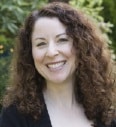 Emeri Handler is a Wexner Heritage Fellow. She serves on the boards of the JCC and Gideon Hausner Jewish Day School, and the board emeritus for TheatreWorks in Palo Alto. Emeri has worked for the Anti-Defamation League and A World of Difference, a diversity training program for teachers and students, and has performed and taught dance and theater.
Emeri Handler is a Wexner Heritage Fellow. She serves on the boards of the JCC and Gideon Hausner Jewish Day School, and the board emeritus for TheatreWorks in Palo Alto. Emeri has worked for the Anti-Defamation League and A World of Difference, a diversity training program for teachers and students, and has performed and taught dance and theater.
Handler spoke to Moving Traditions about how she reimagines the future of Jewish life, leadership and the roles of men and women.
Who inspired your commitment to Jewish life?
Handler: Warm memories of lighting Shabbat candles with my grandmother on Friday nights are at the source of my innate sense of belonging to the Jewish community. As I got older, my intellectual curiosity about Jewish history and wisdom strengthened that connection.
I’ve been so lucky – since I was little I have had the sense that the Jewish community is where I belong. As a lay leader I want to bring this sense to other people.
What compels you to contribute tzedakah?
Handler: Tzedakah is just a basic part of who I am. I saw my grandmother volunteer week after week at a hospital and my mother raise funds for ORT and others. I contribute to the Jewish community in particular because anyone can give to organizations for juvenile diabetes and heart disease, and obviously these are very important; but only Jews give to Jewish causes. I hope my children feel this responsibility as they navigate their philanthropic giving.
What trends and issues do you see as central to Jewish life today?
Handler: People are searching for meaning and need guidance finding their way in the Jewish community. We’re in a time of real change. Old organizations are trying to evolve and new options are emerging, such as minyanim and Moving Traditions’ program,Rosh Hodesh: It’s a Girl Thing!
One of the biggest issues the Jewish community is facing is how to engage teens and young adults through college and into the early stages of their career before they get married. People tend to come back to synagogue once they have children, but many don’t know how to maneuver or which way to turn before then. It’s especially a problem if your parents weren’t involved and if you want something to fit your contemporary life. Where do you go?
What changes do you hope to see in Judaism and in people’s lives over the next two decades as a result of Moving Traditions’ work?
Handler: More girls tend to stay involved in Jewish life than boys – yet most leaders in the Jewish community are men. We need to help girls grow into leaders, and help women find time to daydream and become visionaries. I hope every girl can expect to participate in a Rosh Hodesh: It’s a Girl Thing! group. The program really speaks to the whole person, meeting teenage girls where they are and engaging them in several modalities to accommodate different learning needs and styles.
Men are not necessarily always better leaders. I’d like women to be able to take on more leadership roles and men and boys to re-imagine leadership in different ways – and to be happy to be followers. I’d also like to see boys better able to express their emotions. I think the program Moving Traditions is creating for boys could help make this possible.
In your opinion, what about Jewish life needs to be changed?
Handler: People need an affirmative connection to Jewish life, as opposed to one that is fear-based. Are we only Jewish because of anti-Semitism? If so, what does that say about us?
Judaism is relevant and meaningful if people are willing to put in energy to make it relevant, and I think Moving Traditions’ current and future programs can help with this. Judaism extends back from our parents, grandparents, and beyond – and it also extends forward into our own lives, re-created in our vision. It’s up to us to find the ways to situate Judaism in our communities. It’s easy to blow off Shabbat, but then what kind of purpose and memories are we providing for our children?
Some people think of gender as a women’s issue. Why is the participation of men critical to Moving Traditions’ work?
Handler: We need both men and women reimagining our roles in Jewish life. Both are critical to understanding the opportunities for the Jewish community. That applies to Moving Traditions work with teens as well. We are not forcing predetermined ideas on youth. We are meeting them where they are. Together we can create a Jewish community with different colors and varieties and voices –with all of us at the table